Hamleys: HR Skills, Performance, and Development Report
VerifiedAdded on 2023/01/03
|14
|3994
|65
Report
AI Summary
This report analyzes human resource management practices at Hamleys, a UK-based toy retailer. It begins by identifying essential skills, behaviors, and professional knowledge required of HR managers, including interpersonal and communication skills, recruitment expertise, and knowledge of relevant laws and HR systems. The report then presents a personal skills audit and development plan, highlighting strengths and weaknesses and outlining a learning cycle. It differentiates between individual and organizational learning, and training versus development. Furthermore, the report evaluates the need for continuous learning and personal development plans for effective business performance, emphasizing the benefits of enhanced confidence and increased productivity. The report also explores the concept of high-performance work systems (HPW) and different approaches to performance management, such as collaborative working, illustrating how these practices contribute to employee engagement, competitive advantage, and a high-performance culture within the organization. The report concludes with a summary of key findings and recommendations for improving HR strategies at Hamleys.
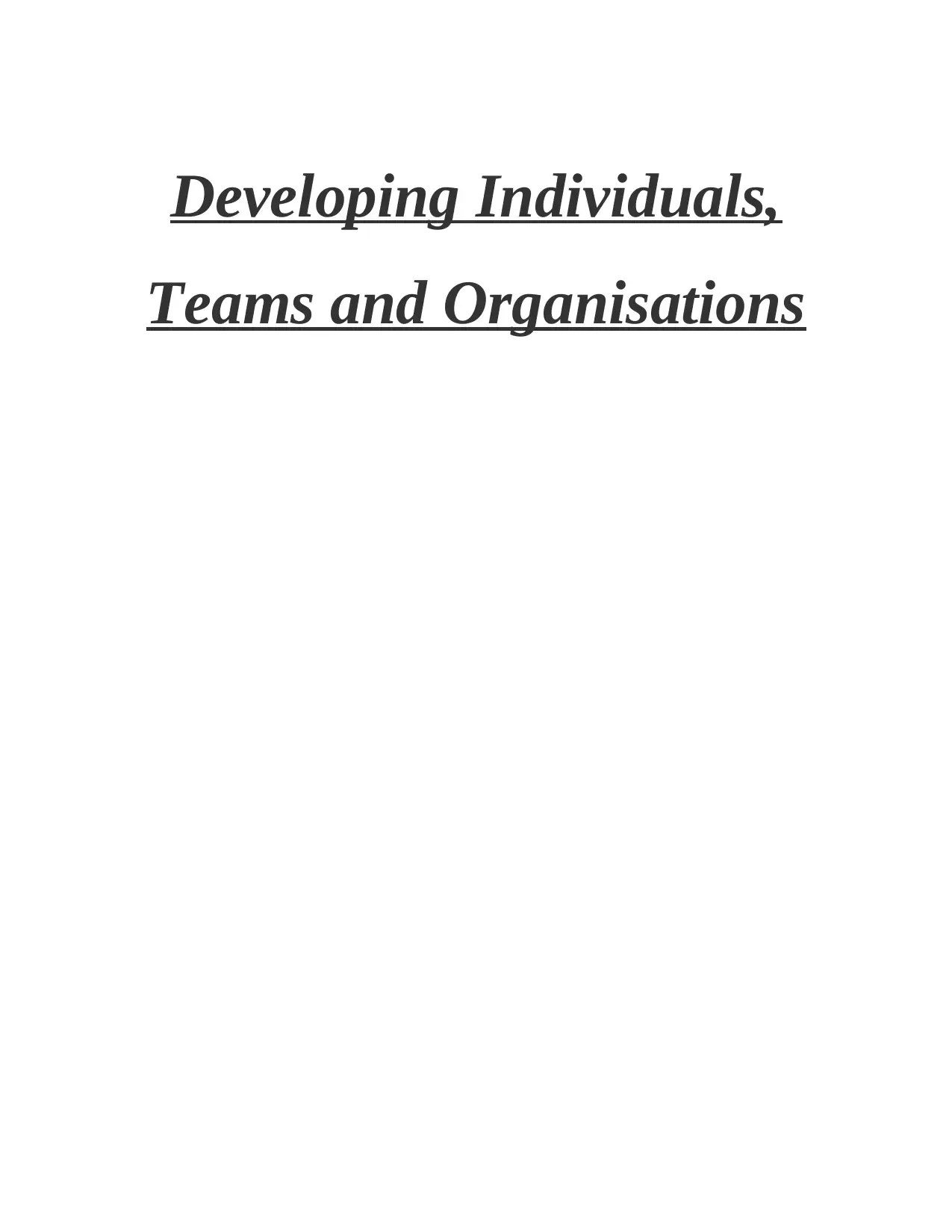
Developing Individuals,
Teams and Organisations
Teams and Organisations
Paraphrase This Document
Need a fresh take? Get an instant paraphrase of this document with our AI Paraphraser
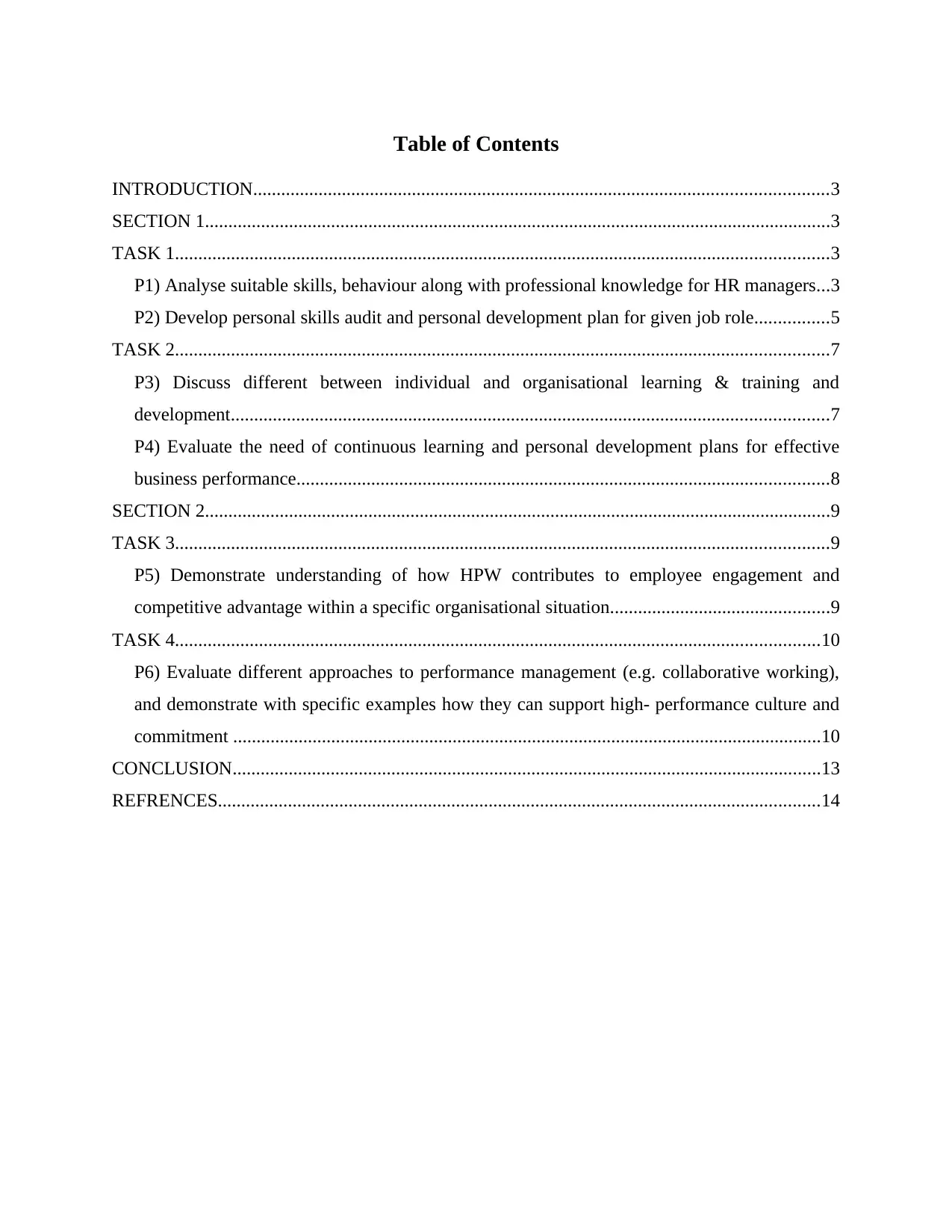
Table of Contents
INTRODUCTION...........................................................................................................................3
SECTION 1......................................................................................................................................3
TASK 1............................................................................................................................................3
P1) Analyse suitable skills, behaviour along with professional knowledge for HR managers...3
P2) Develop personal skills audit and personal development plan for given job role................5
TASK 2............................................................................................................................................7
P3) Discuss different between individual and organisational learning & training and
development................................................................................................................................7
P4) Evaluate the need of continuous learning and personal development plans for effective
business performance..................................................................................................................8
SECTION 2......................................................................................................................................9
TASK 3............................................................................................................................................9
P5) Demonstrate understanding of how HPW contributes to employee engagement and
competitive advantage within a specific organisational situation...............................................9
TASK 4..........................................................................................................................................10
P6) Evaluate different approaches to performance management (e.g. collaborative working),
and demonstrate with specific examples how they can support high- performance culture and
commitment ..............................................................................................................................10
CONCLUSION..............................................................................................................................13
REFRENCES.................................................................................................................................14
INTRODUCTION...........................................................................................................................3
SECTION 1......................................................................................................................................3
TASK 1............................................................................................................................................3
P1) Analyse suitable skills, behaviour along with professional knowledge for HR managers...3
P2) Develop personal skills audit and personal development plan for given job role................5
TASK 2............................................................................................................................................7
P3) Discuss different between individual and organisational learning & training and
development................................................................................................................................7
P4) Evaluate the need of continuous learning and personal development plans for effective
business performance..................................................................................................................8
SECTION 2......................................................................................................................................9
TASK 3............................................................................................................................................9
P5) Demonstrate understanding of how HPW contributes to employee engagement and
competitive advantage within a specific organisational situation...............................................9
TASK 4..........................................................................................................................................10
P6) Evaluate different approaches to performance management (e.g. collaborative working),
and demonstrate with specific examples how they can support high- performance culture and
commitment ..............................................................................................................................10
CONCLUSION..............................................................................................................................13
REFRENCES.................................................................................................................................14
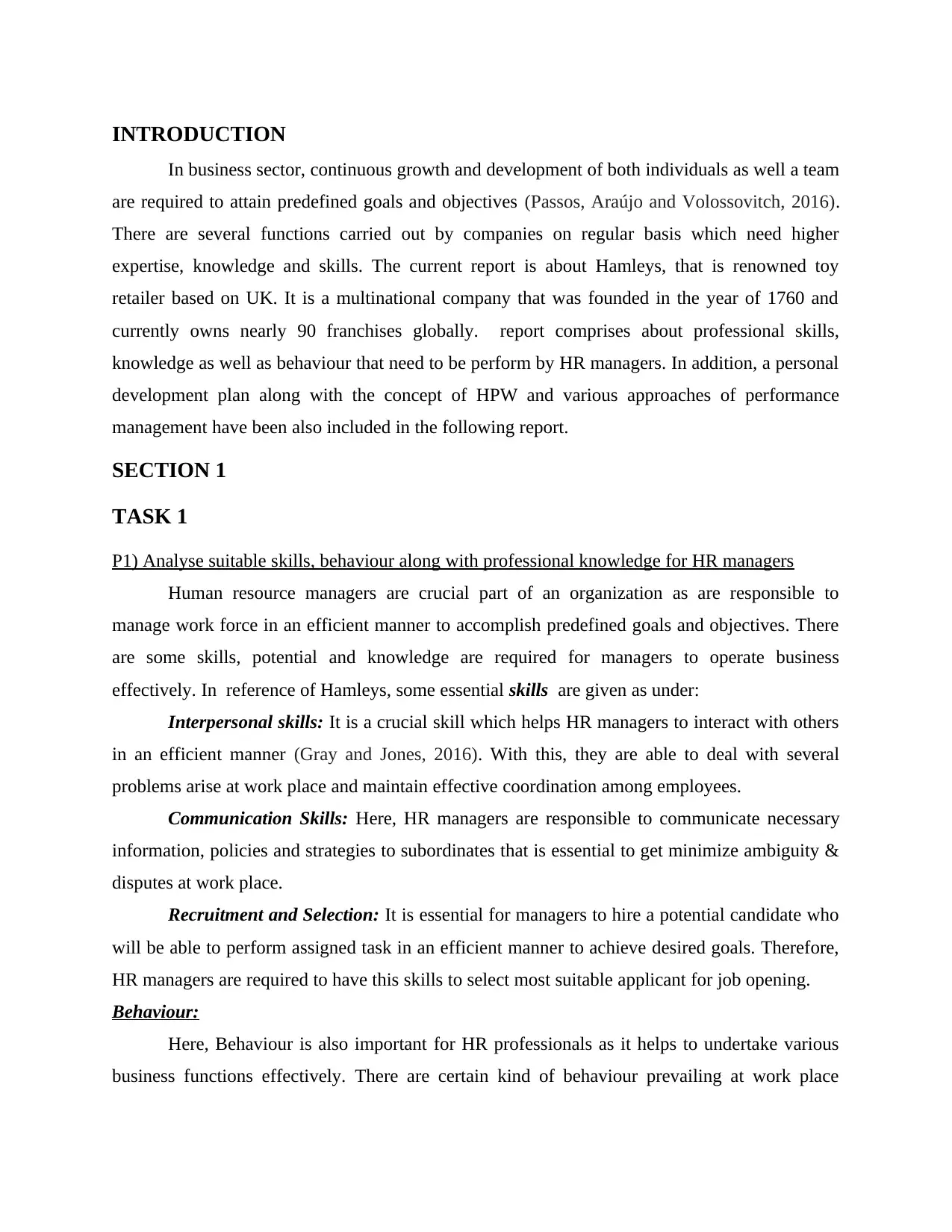
INTRODUCTION
In business sector, continuous growth and development of both individuals as well a team
are required to attain predefined goals and objectives (Passos, Araújo and Volossovitch, 2016).
There are several functions carried out by companies on regular basis which need higher
expertise, knowledge and skills. The current report is about Hamleys, that is renowned toy
retailer based on UK. It is a multinational company that was founded in the year of 1760 and
currently owns nearly 90 franchises globally. report comprises about professional skills,
knowledge as well as behaviour that need to be perform by HR managers. In addition, a personal
development plan along with the concept of HPW and various approaches of performance
management have been also included in the following report.
SECTION 1
TASK 1
P1) Analyse suitable skills, behaviour along with professional knowledge for HR managers
Human resource managers are crucial part of an organization as are responsible to
manage work force in an efficient manner to accomplish predefined goals and objectives. There
are some skills, potential and knowledge are required for managers to operate business
effectively. In reference of Hamleys, some essential skills are given as under:
Interpersonal skills: It is a crucial skill which helps HR managers to interact with others
in an efficient manner (Gray and Jones, 2016). With this, they are able to deal with several
problems arise at work place and maintain effective coordination among employees.
Communication Skills: Here, HR managers are responsible to communicate necessary
information, policies and strategies to subordinates that is essential to get minimize ambiguity &
disputes at work place.
Recruitment and Selection: It is essential for managers to hire a potential candidate who
will be able to perform assigned task in an efficient manner to achieve desired goals. Therefore,
HR managers are required to have this skills to select most suitable applicant for job opening.
Behaviour:
Here, Behaviour is also important for HR professionals as it helps to undertake various
business functions effectively. There are certain kind of behaviour prevailing at work place
In business sector, continuous growth and development of both individuals as well a team
are required to attain predefined goals and objectives (Passos, Araújo and Volossovitch, 2016).
There are several functions carried out by companies on regular basis which need higher
expertise, knowledge and skills. The current report is about Hamleys, that is renowned toy
retailer based on UK. It is a multinational company that was founded in the year of 1760 and
currently owns nearly 90 franchises globally. report comprises about professional skills,
knowledge as well as behaviour that need to be perform by HR managers. In addition, a personal
development plan along with the concept of HPW and various approaches of performance
management have been also included in the following report.
SECTION 1
TASK 1
P1) Analyse suitable skills, behaviour along with professional knowledge for HR managers
Human resource managers are crucial part of an organization as are responsible to
manage work force in an efficient manner to accomplish predefined goals and objectives. There
are some skills, potential and knowledge are required for managers to operate business
effectively. In reference of Hamleys, some essential skills are given as under:
Interpersonal skills: It is a crucial skill which helps HR managers to interact with others
in an efficient manner (Gray and Jones, 2016). With this, they are able to deal with several
problems arise at work place and maintain effective coordination among employees.
Communication Skills: Here, HR managers are responsible to communicate necessary
information, policies and strategies to subordinates that is essential to get minimize ambiguity &
disputes at work place.
Recruitment and Selection: It is essential for managers to hire a potential candidate who
will be able to perform assigned task in an efficient manner to achieve desired goals. Therefore,
HR managers are required to have this skills to select most suitable applicant for job opening.
Behaviour:
Here, Behaviour is also important for HR professionals as it helps to undertake various
business functions effectively. There are certain kind of behaviour prevailing at work place
⊘ This is a preview!⊘
Do you want full access?
Subscribe today to unlock all pages.

Trusted by 1+ million students worldwide
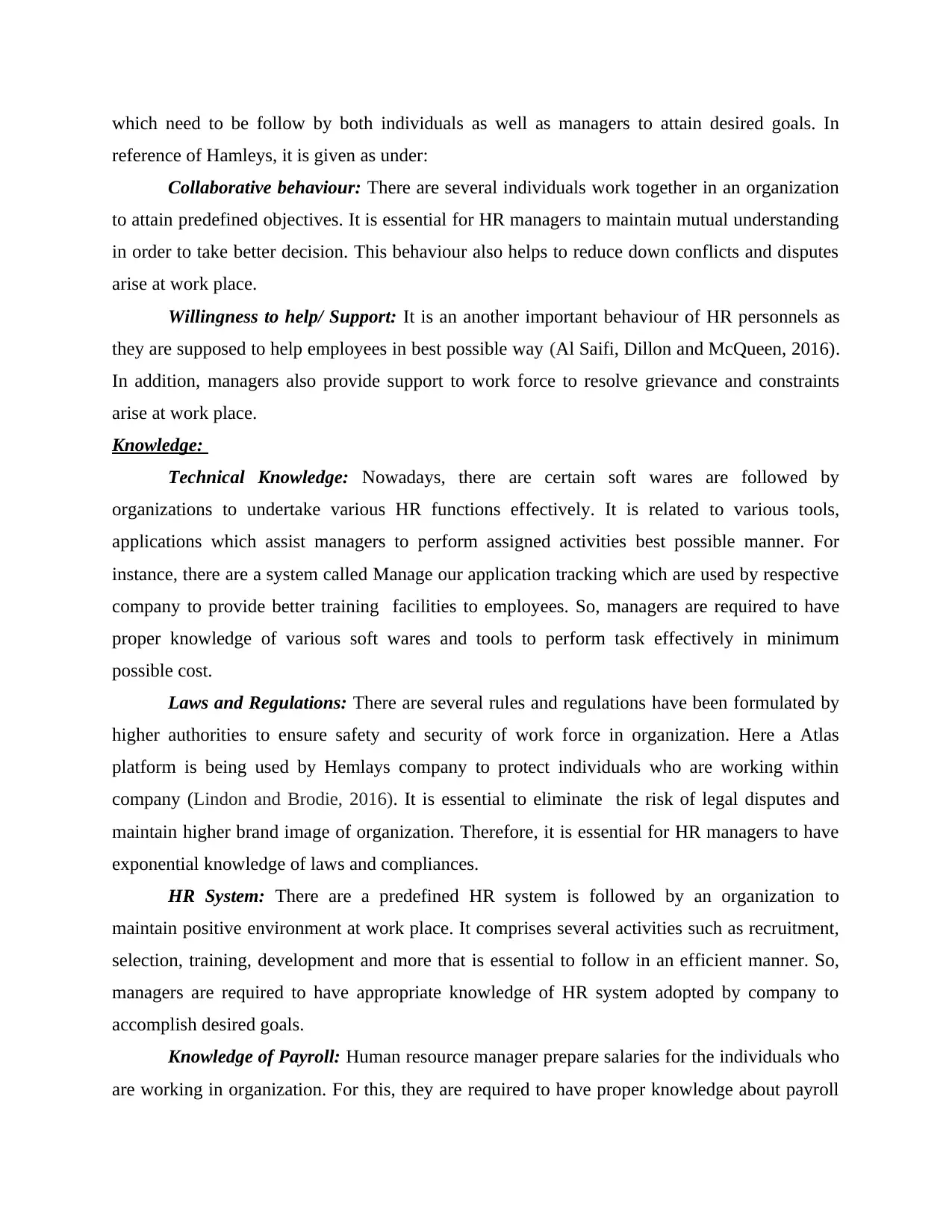
which need to be follow by both individuals as well as managers to attain desired goals. In
reference of Hamleys, it is given as under:
Collaborative behaviour: There are several individuals work together in an organization
to attain predefined objectives. It is essential for HR managers to maintain mutual understanding
in order to take better decision. This behaviour also helps to reduce down conflicts and disputes
arise at work place.
Willingness to help/ Support: It is an another important behaviour of HR personnels as
they are supposed to help employees in best possible way (Al Saifi, Dillon and McQueen, 2016).
In addition, managers also provide support to work force to resolve grievance and constraints
arise at work place.
Knowledge:
Technical Knowledge: Nowadays, there are certain soft wares are followed by
organizations to undertake various HR functions effectively. It is related to various tools,
applications which assist managers to perform assigned activities best possible manner. For
instance, there are a system called Manage our application tracking which are used by respective
company to provide better training facilities to employees. So, managers are required to have
proper knowledge of various soft wares and tools to perform task effectively in minimum
possible cost.
Laws and Regulations: There are several rules and regulations have been formulated by
higher authorities to ensure safety and security of work force in organization. Here a Atlas
platform is being used by Hemlays company to protect individuals who are working within
company (Lindon and Brodie, 2016). It is essential to eliminate the risk of legal disputes and
maintain higher brand image of organization. Therefore, it is essential for HR managers to have
exponential knowledge of laws and compliances.
HR System: There are a predefined HR system is followed by an organization to
maintain positive environment at work place. It comprises several activities such as recruitment,
selection, training, development and more that is essential to follow in an efficient manner. So,
managers are required to have appropriate knowledge of HR system adopted by company to
accomplish desired goals.
Knowledge of Payroll: Human resource manager prepare salaries for the individuals who
are working in organization. For this, they are required to have proper knowledge about payroll
reference of Hamleys, it is given as under:
Collaborative behaviour: There are several individuals work together in an organization
to attain predefined objectives. It is essential for HR managers to maintain mutual understanding
in order to take better decision. This behaviour also helps to reduce down conflicts and disputes
arise at work place.
Willingness to help/ Support: It is an another important behaviour of HR personnels as
they are supposed to help employees in best possible way (Al Saifi, Dillon and McQueen, 2016).
In addition, managers also provide support to work force to resolve grievance and constraints
arise at work place.
Knowledge:
Technical Knowledge: Nowadays, there are certain soft wares are followed by
organizations to undertake various HR functions effectively. It is related to various tools,
applications which assist managers to perform assigned activities best possible manner. For
instance, there are a system called Manage our application tracking which are used by respective
company to provide better training facilities to employees. So, managers are required to have
proper knowledge of various soft wares and tools to perform task effectively in minimum
possible cost.
Laws and Regulations: There are several rules and regulations have been formulated by
higher authorities to ensure safety and security of work force in organization. Here a Atlas
platform is being used by Hemlays company to protect individuals who are working within
company (Lindon and Brodie, 2016). It is essential to eliminate the risk of legal disputes and
maintain higher brand image of organization. Therefore, it is essential for HR managers to have
exponential knowledge of laws and compliances.
HR System: There are a predefined HR system is followed by an organization to
maintain positive environment at work place. It comprises several activities such as recruitment,
selection, training, development and more that is essential to follow in an efficient manner. So,
managers are required to have appropriate knowledge of HR system adopted by company to
accomplish desired goals.
Knowledge of Payroll: Human resource manager prepare salaries for the individuals who
are working in organization. For this, they are required to have proper knowledge about payroll
Paraphrase This Document
Need a fresh take? Get an instant paraphrase of this document with our AI Paraphraser
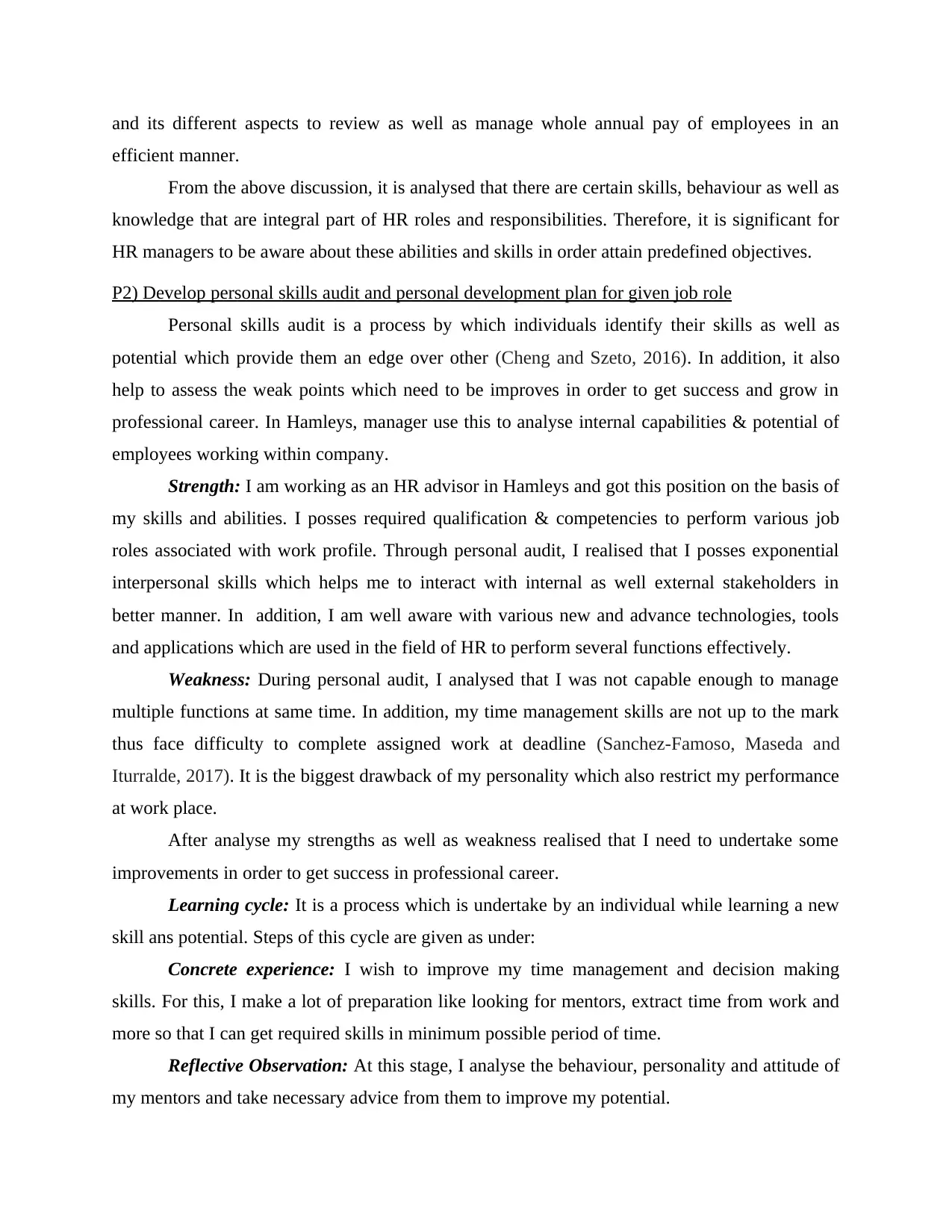
and its different aspects to review as well as manage whole annual pay of employees in an
efficient manner.
From the above discussion, it is analysed that there are certain skills, behaviour as well as
knowledge that are integral part of HR roles and responsibilities. Therefore, it is significant for
HR managers to be aware about these abilities and skills in order attain predefined objectives.
P2) Develop personal skills audit and personal development plan for given job role
Personal skills audit is a process by which individuals identify their skills as well as
potential which provide them an edge over other (Cheng and Szeto, 2016). In addition, it also
help to assess the weak points which need to be improves in order to get success and grow in
professional career. In Hamleys, manager use this to analyse internal capabilities & potential of
employees working within company.
Strength: I am working as an HR advisor in Hamleys and got this position on the basis of
my skills and abilities. I posses required qualification & competencies to perform various job
roles associated with work profile. Through personal audit, I realised that I posses exponential
interpersonal skills which helps me to interact with internal as well external stakeholders in
better manner. In addition, I am well aware with various new and advance technologies, tools
and applications which are used in the field of HR to perform several functions effectively.
Weakness: During personal audit, I analysed that I was not capable enough to manage
multiple functions at same time. In addition, my time management skills are not up to the mark
thus face difficulty to complete assigned work at deadline (Sanchez-Famoso, Maseda and
Iturralde, 2017). It is the biggest drawback of my personality which also restrict my performance
at work place.
After analyse my strengths as well as weakness realised that I need to undertake some
improvements in order to get success in professional career.
Learning cycle: It is a process which is undertake by an individual while learning a new
skill ans potential. Steps of this cycle are given as under:
Concrete experience: I wish to improve my time management and decision making
skills. For this, I make a lot of preparation like looking for mentors, extract time from work and
more so that I can get required skills in minimum possible period of time.
Reflective Observation: At this stage, I analyse the behaviour, personality and attitude of
my mentors and take necessary advice from them to improve my potential.
efficient manner.
From the above discussion, it is analysed that there are certain skills, behaviour as well as
knowledge that are integral part of HR roles and responsibilities. Therefore, it is significant for
HR managers to be aware about these abilities and skills in order attain predefined objectives.
P2) Develop personal skills audit and personal development plan for given job role
Personal skills audit is a process by which individuals identify their skills as well as
potential which provide them an edge over other (Cheng and Szeto, 2016). In addition, it also
help to assess the weak points which need to be improves in order to get success and grow in
professional career. In Hamleys, manager use this to analyse internal capabilities & potential of
employees working within company.
Strength: I am working as an HR advisor in Hamleys and got this position on the basis of
my skills and abilities. I posses required qualification & competencies to perform various job
roles associated with work profile. Through personal audit, I realised that I posses exponential
interpersonal skills which helps me to interact with internal as well external stakeholders in
better manner. In addition, I am well aware with various new and advance technologies, tools
and applications which are used in the field of HR to perform several functions effectively.
Weakness: During personal audit, I analysed that I was not capable enough to manage
multiple functions at same time. In addition, my time management skills are not up to the mark
thus face difficulty to complete assigned work at deadline (Sanchez-Famoso, Maseda and
Iturralde, 2017). It is the biggest drawback of my personality which also restrict my performance
at work place.
After analyse my strengths as well as weakness realised that I need to undertake some
improvements in order to get success in professional career.
Learning cycle: It is a process which is undertake by an individual while learning a new
skill ans potential. Steps of this cycle are given as under:
Concrete experience: I wish to improve my time management and decision making
skills. For this, I make a lot of preparation like looking for mentors, extract time from work and
more so that I can get required skills in minimum possible period of time.
Reflective Observation: At this stage, I analyse the behaviour, personality and attitude of
my mentors and take necessary advice from them to improve my potential.
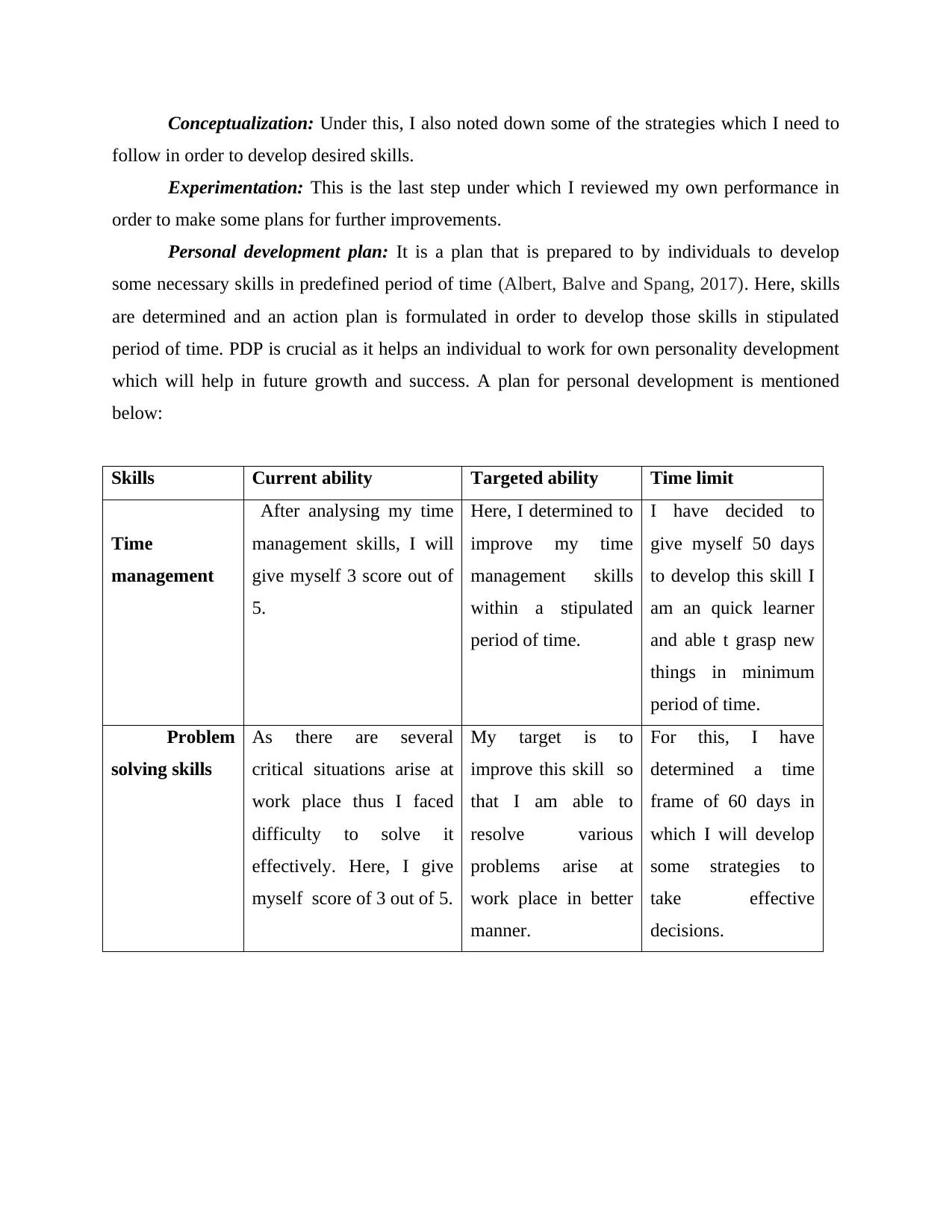
Conceptualization: Under this, I also noted down some of the strategies which I need to
follow in order to develop desired skills.
Experimentation: This is the last step under which I reviewed my own performance in
order to make some plans for further improvements.
Personal development plan: It is a plan that is prepared to by individuals to develop
some necessary skills in predefined period of time (Albert, Balve and Spang, 2017). Here, skills
are determined and an action plan is formulated in order to develop those skills in stipulated
period of time. PDP is crucial as it helps an individual to work for own personality development
which will help in future growth and success. A plan for personal development is mentioned
below:
Skills Current ability Targeted ability Time limit
Time
management
After analysing my time
management skills, I will
give myself 3 score out of
5.
Here, I determined to
improve my time
management skills
within a stipulated
period of time.
I have decided to
give myself 50 days
to develop this skill I
am an quick learner
and able t grasp new
things in minimum
period of time.
Problem
solving skills
As there are several
critical situations arise at
work place thus I faced
difficulty to solve it
effectively. Here, I give
myself score of 3 out of 5.
My target is to
improve this skill so
that I am able to
resolve various
problems arise at
work place in better
manner.
For this, I have
determined a time
frame of 60 days in
which I will develop
some strategies to
take effective
decisions.
follow in order to develop desired skills.
Experimentation: This is the last step under which I reviewed my own performance in
order to make some plans for further improvements.
Personal development plan: It is a plan that is prepared to by individuals to develop
some necessary skills in predefined period of time (Albert, Balve and Spang, 2017). Here, skills
are determined and an action plan is formulated in order to develop those skills in stipulated
period of time. PDP is crucial as it helps an individual to work for own personality development
which will help in future growth and success. A plan for personal development is mentioned
below:
Skills Current ability Targeted ability Time limit
Time
management
After analysing my time
management skills, I will
give myself 3 score out of
5.
Here, I determined to
improve my time
management skills
within a stipulated
period of time.
I have decided to
give myself 50 days
to develop this skill I
am an quick learner
and able t grasp new
things in minimum
period of time.
Problem
solving skills
As there are several
critical situations arise at
work place thus I faced
difficulty to solve it
effectively. Here, I give
myself score of 3 out of 5.
My target is to
improve this skill so
that I am able to
resolve various
problems arise at
work place in better
manner.
For this, I have
determined a time
frame of 60 days in
which I will develop
some strategies to
take effective
decisions.
⊘ This is a preview!⊘
Do you want full access?
Subscribe today to unlock all pages.

Trusted by 1+ million students worldwide
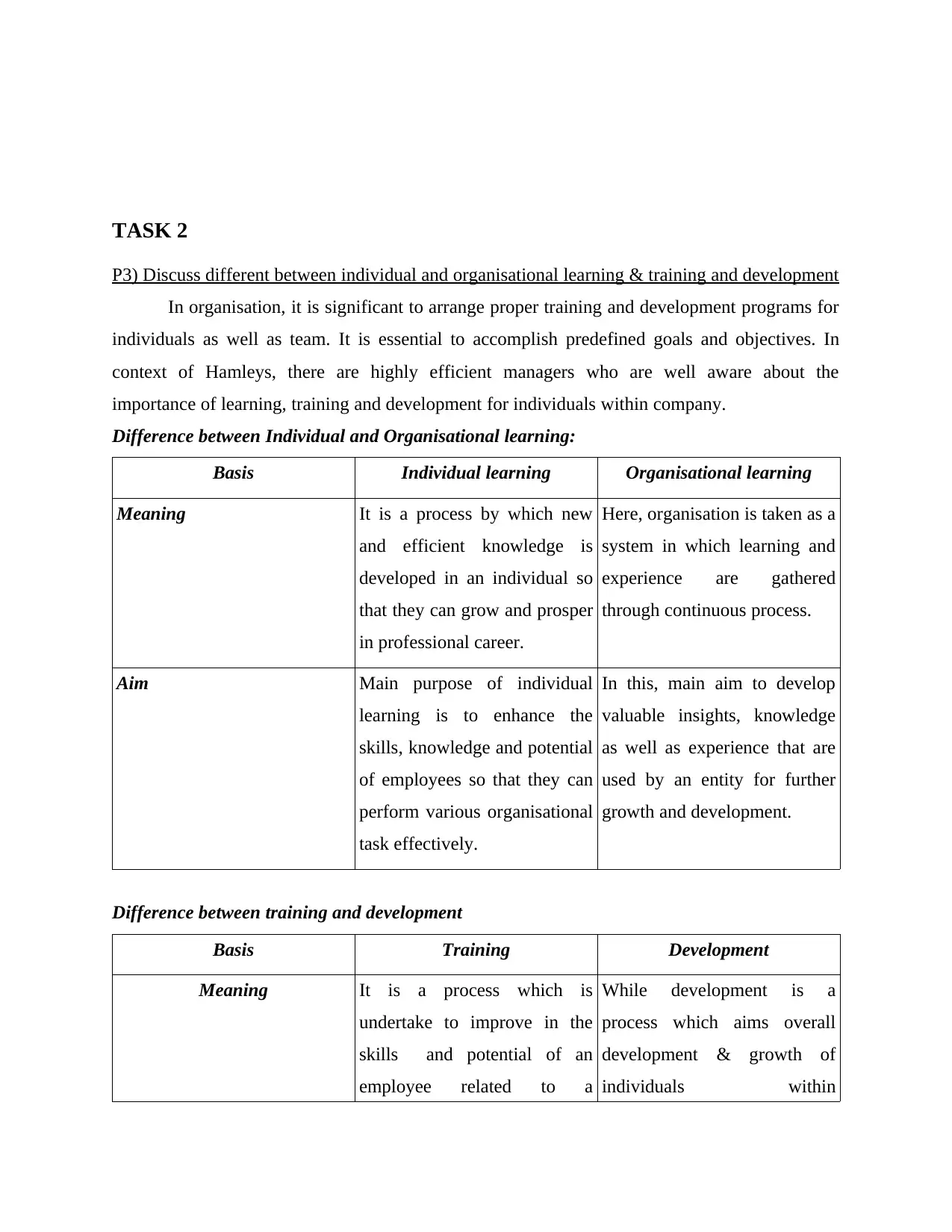
TASK 2
P3) Discuss different between individual and organisational learning & training and development
In organisation, it is significant to arrange proper training and development programs for
individuals as well as team. It is essential to accomplish predefined goals and objectives. In
context of Hamleys, there are highly efficient managers who are well aware about the
importance of learning, training and development for individuals within company.
Difference between Individual and Organisational learning:
Basis Individual learning Organisational learning
Meaning It is a process by which new
and efficient knowledge is
developed in an individual so
that they can grow and prosper
in professional career.
Here, organisation is taken as a
system in which learning and
experience are gathered
through continuous process.
Aim Main purpose of individual
learning is to enhance the
skills, knowledge and potential
of employees so that they can
perform various organisational
task effectively.
In this, main aim to develop
valuable insights, knowledge
as well as experience that are
used by an entity for further
growth and development.
Difference between training and development
Basis Training Development
Meaning It is a process which is
undertake to improve in the
skills and potential of an
employee related to a
While development is a
process which aims overall
development & growth of
individuals within
P3) Discuss different between individual and organisational learning & training and development
In organisation, it is significant to arrange proper training and development programs for
individuals as well as team. It is essential to accomplish predefined goals and objectives. In
context of Hamleys, there are highly efficient managers who are well aware about the
importance of learning, training and development for individuals within company.
Difference between Individual and Organisational learning:
Basis Individual learning Organisational learning
Meaning It is a process by which new
and efficient knowledge is
developed in an individual so
that they can grow and prosper
in professional career.
Here, organisation is taken as a
system in which learning and
experience are gathered
through continuous process.
Aim Main purpose of individual
learning is to enhance the
skills, knowledge and potential
of employees so that they can
perform various organisational
task effectively.
In this, main aim to develop
valuable insights, knowledge
as well as experience that are
used by an entity for further
growth and development.
Difference between training and development
Basis Training Development
Meaning It is a process which is
undertake to improve in the
skills and potential of an
employee related to a
While development is a
process which aims overall
development & growth of
individuals within
Paraphrase This Document
Need a fresh take? Get an instant paraphrase of this document with our AI Paraphraser
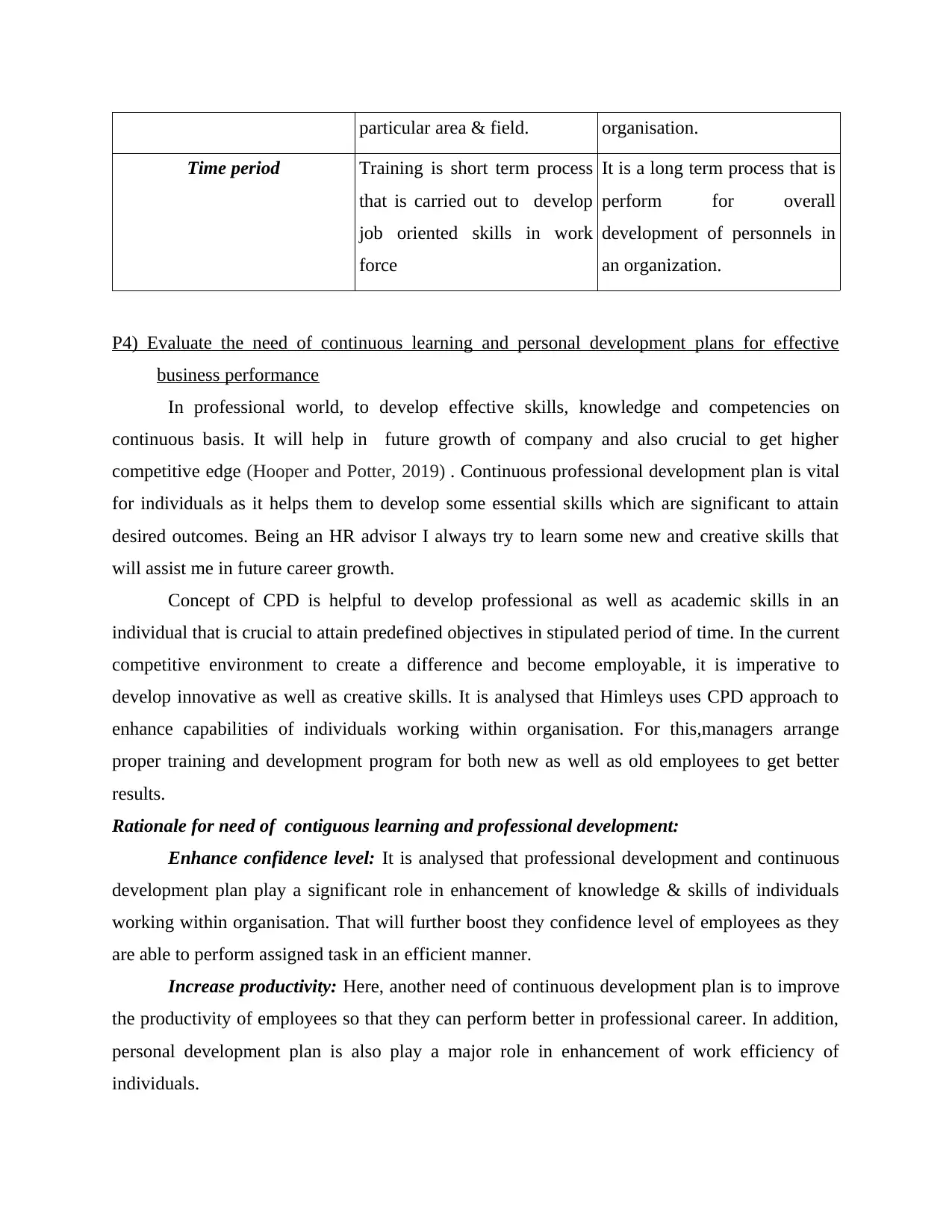
particular area & field. organisation.
Time period Training is short term process
that is carried out to develop
job oriented skills in work
force
It is a long term process that is
perform for overall
development of personnels in
an organization.
P4) Evaluate the need of continuous learning and personal development plans for effective
business performance
In professional world, to develop effective skills, knowledge and competencies on
continuous basis. It will help in future growth of company and also crucial to get higher
competitive edge (Hooper and Potter, 2019) . Continuous professional development plan is vital
for individuals as it helps them to develop some essential skills which are significant to attain
desired outcomes. Being an HR advisor I always try to learn some new and creative skills that
will assist me in future career growth.
Concept of CPD is helpful to develop professional as well as academic skills in an
individual that is crucial to attain predefined objectives in stipulated period of time. In the current
competitive environment to create a difference and become employable, it is imperative to
develop innovative as well as creative skills. It is analysed that Himleys uses CPD approach to
enhance capabilities of individuals working within organisation. For this,managers arrange
proper training and development program for both new as well as old employees to get better
results.
Rationale for need of contiguous learning and professional development:
Enhance confidence level: It is analysed that professional development and continuous
development plan play a significant role in enhancement of knowledge & skills of individuals
working within organisation. That will further boost they confidence level of employees as they
are able to perform assigned task in an efficient manner.
Increase productivity: Here, another need of continuous development plan is to improve
the productivity of employees so that they can perform better in professional career. In addition,
personal development plan is also play a major role in enhancement of work efficiency of
individuals.
Time period Training is short term process
that is carried out to develop
job oriented skills in work
force
It is a long term process that is
perform for overall
development of personnels in
an organization.
P4) Evaluate the need of continuous learning and personal development plans for effective
business performance
In professional world, to develop effective skills, knowledge and competencies on
continuous basis. It will help in future growth of company and also crucial to get higher
competitive edge (Hooper and Potter, 2019) . Continuous professional development plan is vital
for individuals as it helps them to develop some essential skills which are significant to attain
desired outcomes. Being an HR advisor I always try to learn some new and creative skills that
will assist me in future career growth.
Concept of CPD is helpful to develop professional as well as academic skills in an
individual that is crucial to attain predefined objectives in stipulated period of time. In the current
competitive environment to create a difference and become employable, it is imperative to
develop innovative as well as creative skills. It is analysed that Himleys uses CPD approach to
enhance capabilities of individuals working within organisation. For this,managers arrange
proper training and development program for both new as well as old employees to get better
results.
Rationale for need of contiguous learning and professional development:
Enhance confidence level: It is analysed that professional development and continuous
development plan play a significant role in enhancement of knowledge & skills of individuals
working within organisation. That will further boost they confidence level of employees as they
are able to perform assigned task in an efficient manner.
Increase productivity: Here, another need of continuous development plan is to improve
the productivity of employees so that they can perform better in professional career. In addition,
personal development plan is also play a major role in enhancement of work efficiency of
individuals.
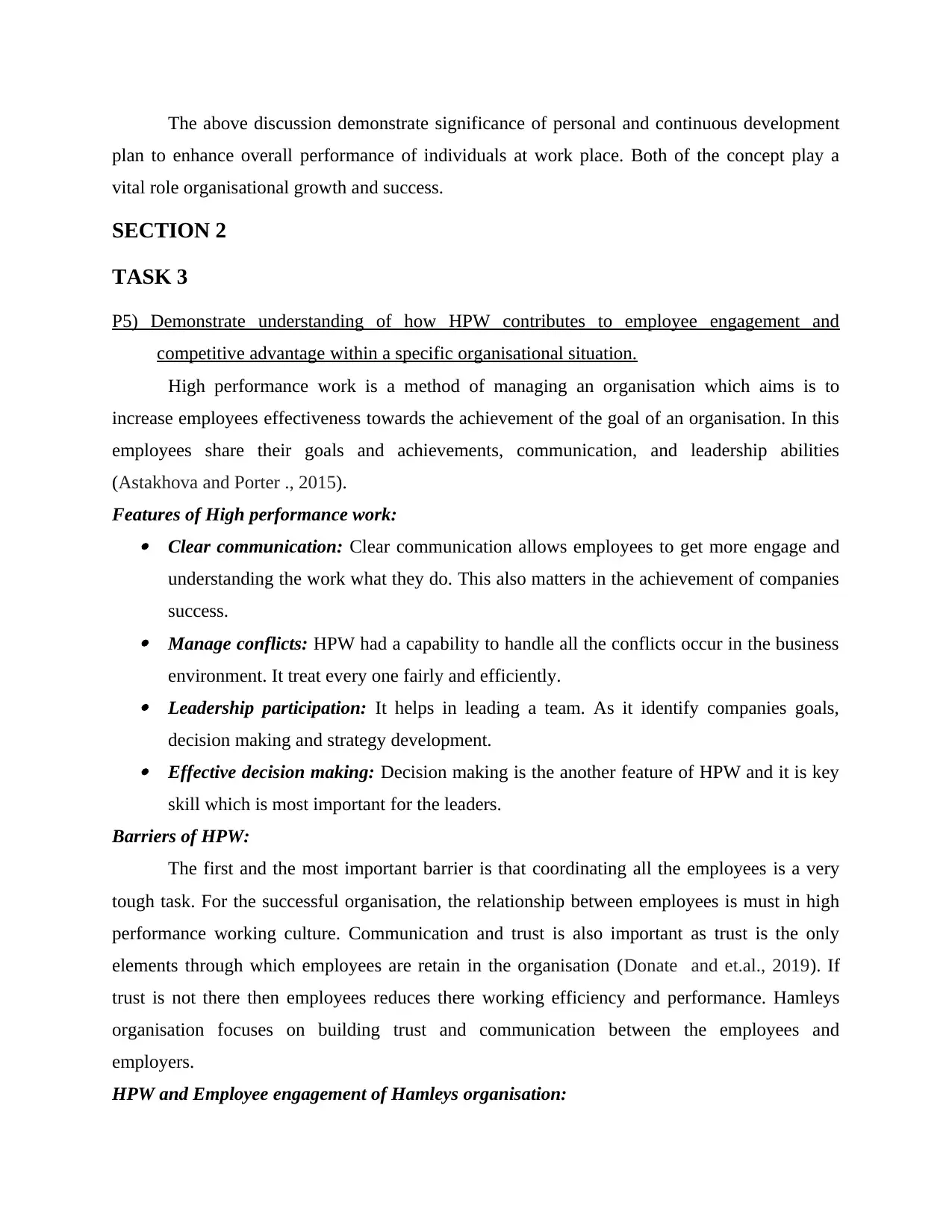
The above discussion demonstrate significance of personal and continuous development
plan to enhance overall performance of individuals at work place. Both of the concept play a
vital role organisational growth and success.
SECTION 2
TASK 3
P5) Demonstrate understanding of how HPW contributes to employee engagement and
competitive advantage within a specific organisational situation.
High performance work is a method of managing an organisation which aims is to
increase employees effectiveness towards the achievement of the goal of an organisation. In this
employees share their goals and achievements, communication, and leadership abilities
(Astakhova and Porter ., 2015).
Features of High performance work: Clear communication: Clear communication allows employees to get more engage and
understanding the work what they do. This also matters in the achievement of companies
success. Manage conflicts: HPW had a capability to handle all the conflicts occur in the business
environment. It treat every one fairly and efficiently. Leadership participation: It helps in leading a team. As it identify companies goals,
decision making and strategy development. Effective decision making: Decision making is the another feature of HPW and it is key
skill which is most important for the leaders.
Barriers of HPW:
The first and the most important barrier is that coordinating all the employees is a very
tough task. For the successful organisation, the relationship between employees is must in high
performance working culture. Communication and trust is also important as trust is the only
elements through which employees are retain in the organisation (Donate and et.al., 2019). If
trust is not there then employees reduces there working efficiency and performance. Hamleys
organisation focuses on building trust and communication between the employees and
employers.
HPW and Employee engagement of Hamleys organisation:
plan to enhance overall performance of individuals at work place. Both of the concept play a
vital role organisational growth and success.
SECTION 2
TASK 3
P5) Demonstrate understanding of how HPW contributes to employee engagement and
competitive advantage within a specific organisational situation.
High performance work is a method of managing an organisation which aims is to
increase employees effectiveness towards the achievement of the goal of an organisation. In this
employees share their goals and achievements, communication, and leadership abilities
(Astakhova and Porter ., 2015).
Features of High performance work: Clear communication: Clear communication allows employees to get more engage and
understanding the work what they do. This also matters in the achievement of companies
success. Manage conflicts: HPW had a capability to handle all the conflicts occur in the business
environment. It treat every one fairly and efficiently. Leadership participation: It helps in leading a team. As it identify companies goals,
decision making and strategy development. Effective decision making: Decision making is the another feature of HPW and it is key
skill which is most important for the leaders.
Barriers of HPW:
The first and the most important barrier is that coordinating all the employees is a very
tough task. For the successful organisation, the relationship between employees is must in high
performance working culture. Communication and trust is also important as trust is the only
elements through which employees are retain in the organisation (Donate and et.al., 2019). If
trust is not there then employees reduces there working efficiency and performance. Hamleys
organisation focuses on building trust and communication between the employees and
employers.
HPW and Employee engagement of Hamleys organisation:
⊘ This is a preview!⊘
Do you want full access?
Subscribe today to unlock all pages.

Trusted by 1+ million students worldwide
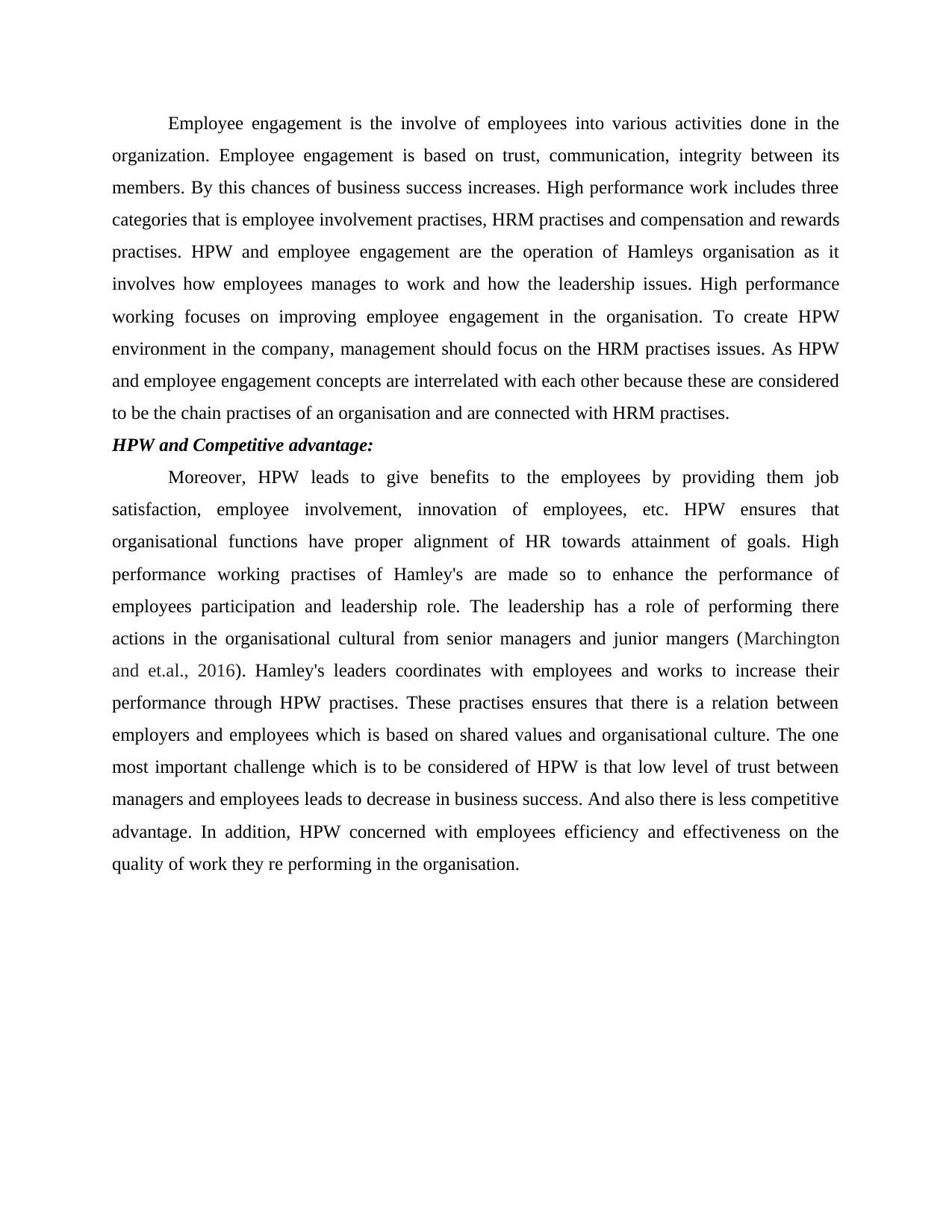
Employee engagement is the involve of employees into various activities done in the
organization. Employee engagement is based on trust, communication, integrity between its
members. By this chances of business success increases. High performance work includes three
categories that is employee involvement practises, HRM practises and compensation and rewards
practises. HPW and employee engagement are the operation of Hamleys organisation as it
involves how employees manages to work and how the leadership issues. High performance
working focuses on improving employee engagement in the organisation. To create HPW
environment in the company, management should focus on the HRM practises issues. As HPW
and employee engagement concepts are interrelated with each other because these are considered
to be the chain practises of an organisation and are connected with HRM practises.
HPW and Competitive advantage:
Moreover, HPW leads to give benefits to the employees by providing them job
satisfaction, employee involvement, innovation of employees, etc. HPW ensures that
organisational functions have proper alignment of HR towards attainment of goals. High
performance working practises of Hamley's are made so to enhance the performance of
employees participation and leadership role. The leadership has a role of performing there
actions in the organisational cultural from senior managers and junior mangers (Marchington
and et.al., 2016). Hamley's leaders coordinates with employees and works to increase their
performance through HPW practises. These practises ensures that there is a relation between
employers and employees which is based on shared values and organisational culture. The one
most important challenge which is to be considered of HPW is that low level of trust between
managers and employees leads to decrease in business success. And also there is less competitive
advantage. In addition, HPW concerned with employees efficiency and effectiveness on the
quality of work they re performing in the organisation.
organization. Employee engagement is based on trust, communication, integrity between its
members. By this chances of business success increases. High performance work includes three
categories that is employee involvement practises, HRM practises and compensation and rewards
practises. HPW and employee engagement are the operation of Hamleys organisation as it
involves how employees manages to work and how the leadership issues. High performance
working focuses on improving employee engagement in the organisation. To create HPW
environment in the company, management should focus on the HRM practises issues. As HPW
and employee engagement concepts are interrelated with each other because these are considered
to be the chain practises of an organisation and are connected with HRM practises.
HPW and Competitive advantage:
Moreover, HPW leads to give benefits to the employees by providing them job
satisfaction, employee involvement, innovation of employees, etc. HPW ensures that
organisational functions have proper alignment of HR towards attainment of goals. High
performance working practises of Hamley's are made so to enhance the performance of
employees participation and leadership role. The leadership has a role of performing there
actions in the organisational cultural from senior managers and junior mangers (Marchington
and et.al., 2016). Hamley's leaders coordinates with employees and works to increase their
performance through HPW practises. These practises ensures that there is a relation between
employers and employees which is based on shared values and organisational culture. The one
most important challenge which is to be considered of HPW is that low level of trust between
managers and employees leads to decrease in business success. And also there is less competitive
advantage. In addition, HPW concerned with employees efficiency and effectiveness on the
quality of work they re performing in the organisation.
Paraphrase This Document
Need a fresh take? Get an instant paraphrase of this document with our AI Paraphraser
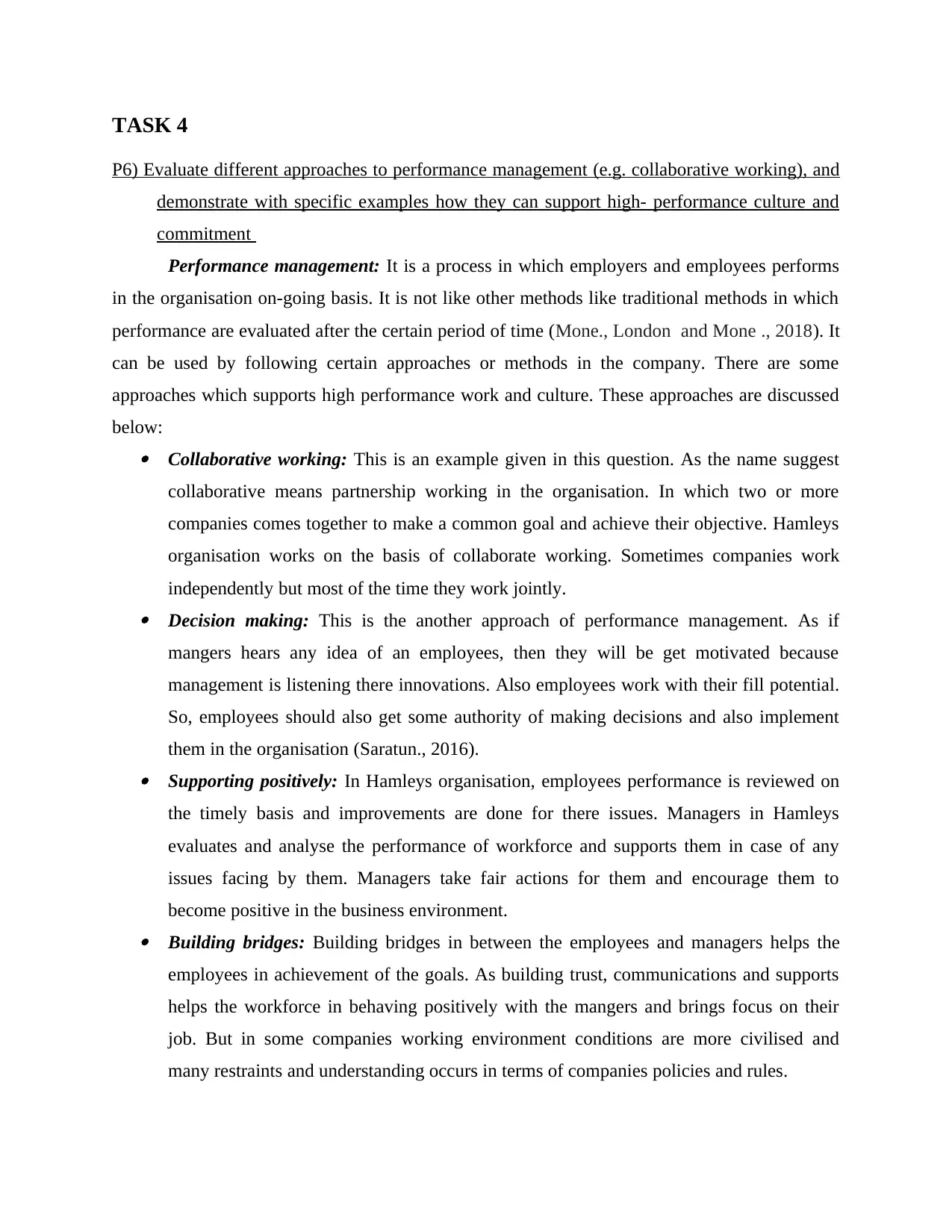
TASK 4
P6) Evaluate different approaches to performance management (e.g. collaborative working), and
demonstrate with specific examples how they can support high- performance culture and
commitment
Performance management: It is a process in which employers and employees performs
in the organisation on-going basis. It is not like other methods like traditional methods in which
performance are evaluated after the certain period of time (Mone., London and Mone ., 2018). It
can be used by following certain approaches or methods in the company. There are some
approaches which supports high performance work and culture. These approaches are discussed
below: Collaborative working: This is an example given in this question. As the name suggest
collaborative means partnership working in the organisation. In which two or more
companies comes together to make a common goal and achieve their objective. Hamleys
organisation works on the basis of collaborate working. Sometimes companies work
independently but most of the time they work jointly. Decision making: This is the another approach of performance management. As if
mangers hears any idea of an employees, then they will be get motivated because
management is listening there innovations. Also employees work with their fill potential.
So, employees should also get some authority of making decisions and also implement
them in the organisation (Saratun., 2016). Supporting positively: In Hamleys organisation, employees performance is reviewed on
the timely basis and improvements are done for there issues. Managers in Hamleys
evaluates and analyse the performance of workforce and supports them in case of any
issues facing by them. Managers take fair actions for them and encourage them to
become positive in the business environment. Building bridges: Building bridges in between the employees and managers helps the
employees in achievement of the goals. As building trust, communications and supports
helps the workforce in behaving positively with the mangers and brings focus on their
job. But in some companies working environment conditions are more civilised and
many restraints and understanding occurs in terms of companies policies and rules.
P6) Evaluate different approaches to performance management (e.g. collaborative working), and
demonstrate with specific examples how they can support high- performance culture and
commitment
Performance management: It is a process in which employers and employees performs
in the organisation on-going basis. It is not like other methods like traditional methods in which
performance are evaluated after the certain period of time (Mone., London and Mone ., 2018). It
can be used by following certain approaches or methods in the company. There are some
approaches which supports high performance work and culture. These approaches are discussed
below: Collaborative working: This is an example given in this question. As the name suggest
collaborative means partnership working in the organisation. In which two or more
companies comes together to make a common goal and achieve their objective. Hamleys
organisation works on the basis of collaborate working. Sometimes companies work
independently but most of the time they work jointly. Decision making: This is the another approach of performance management. As if
mangers hears any idea of an employees, then they will be get motivated because
management is listening there innovations. Also employees work with their fill potential.
So, employees should also get some authority of making decisions and also implement
them in the organisation (Saratun., 2016). Supporting positively: In Hamleys organisation, employees performance is reviewed on
the timely basis and improvements are done for there issues. Managers in Hamleys
evaluates and analyse the performance of workforce and supports them in case of any
issues facing by them. Managers take fair actions for them and encourage them to
become positive in the business environment. Building bridges: Building bridges in between the employees and managers helps the
employees in achievement of the goals. As building trust, communications and supports
helps the workforce in behaving positively with the mangers and brings focus on their
job. But in some companies working environment conditions are more civilised and
many restraints and understanding occurs in terms of companies policies and rules.
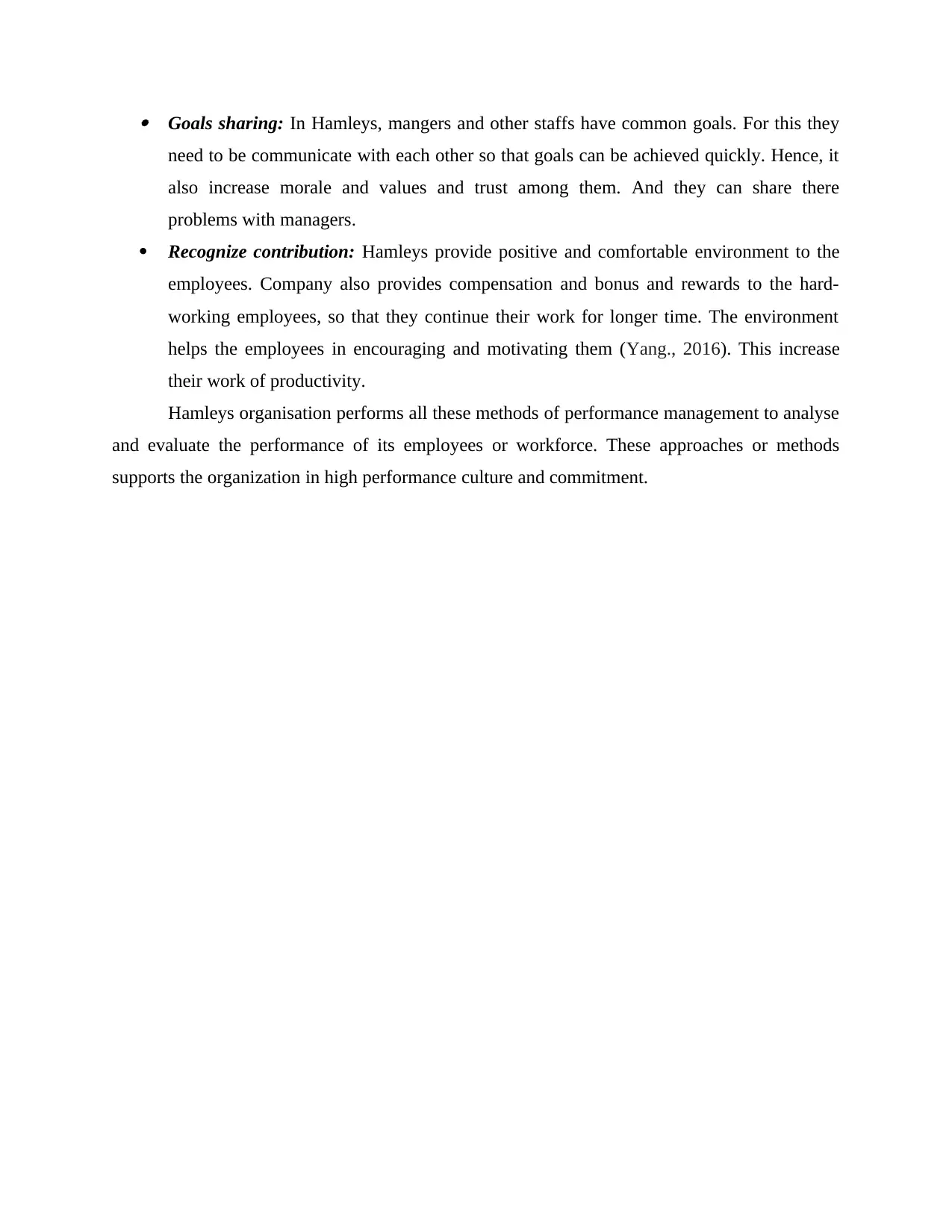
Goals sharing: In Hamleys, mangers and other staffs have common goals. For this they
need to be communicate with each other so that goals can be achieved quickly. Hence, it
also increase morale and values and trust among them. And they can share there
problems with managers.
Recognize contribution: Hamleys provide positive and comfortable environment to the
employees. Company also provides compensation and bonus and rewards to the hard-
working employees, so that they continue their work for longer time. The environment
helps the employees in encouraging and motivating them (Yang., 2016). This increase
their work of productivity.
Hamleys organisation performs all these methods of performance management to analyse
and evaluate the performance of its employees or workforce. These approaches or methods
supports the organization in high performance culture and commitment.
need to be communicate with each other so that goals can be achieved quickly. Hence, it
also increase morale and values and trust among them. And they can share there
problems with managers.
Recognize contribution: Hamleys provide positive and comfortable environment to the
employees. Company also provides compensation and bonus and rewards to the hard-
working employees, so that they continue their work for longer time. The environment
helps the employees in encouraging and motivating them (Yang., 2016). This increase
their work of productivity.
Hamleys organisation performs all these methods of performance management to analyse
and evaluate the performance of its employees or workforce. These approaches or methods
supports the organization in high performance culture and commitment.
⊘ This is a preview!⊘
Do you want full access?
Subscribe today to unlock all pages.

Trusted by 1+ million students worldwide
1 out of 14
Related Documents
Your All-in-One AI-Powered Toolkit for Academic Success.
+13062052269
info@desklib.com
Available 24*7 on WhatsApp / Email
![[object Object]](/_next/static/media/star-bottom.7253800d.svg)
Unlock your academic potential
Copyright © 2020–2026 A2Z Services. All Rights Reserved. Developed and managed by ZUCOL.




